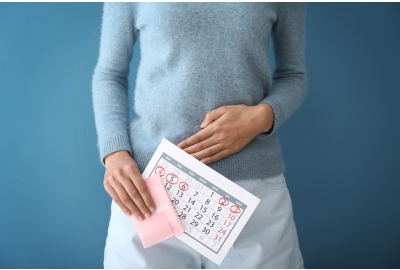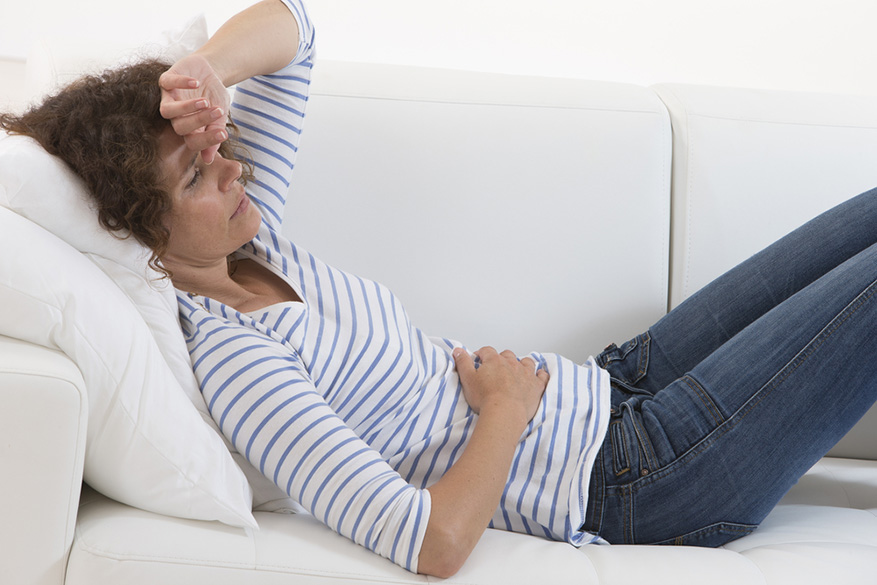
What Is the Difference Between Perimenopause and Menopause?
We sat down with a group of women to ask them questions about menopause, incontinence, and everything in between. When we asked them if they felt like there is adequate information surrounding menopause topics, All three women yelled “no” and laughed when asked. One even said “even perimenopause symptoms are vague…” and we’re here to help fix that.
As you age, you may notice your periods becoming more and more irregular, and you’re wondering if you might have entered menopause. What you might not know is that there’s actually a period before menopause, called perimenopause, that precedes the complete stopping of your period. Here’s what you need to know about the difference between perimenopause and menopause:

By pixelheadphoto digitalskillet / Shutterstock.com
Perimenopause vs. Menopause
Perimenopause is the lead-up period to menopause. It occurs when your body is beginning to undergo hormonal changes, but you might still be able to get pregnant. During early perimenopause, you will experience irregular menstrual cycles, and most women enter perimenopause when their period comes a week or later more than usual over the course of several months. If your periods have always been irregular, it can make it hard to determine if you’re going through menopause or not since you don’t have a regular schedule to compare it to.
Late-stage perimenopause is easier to identify because it occurs when there are at least 60 days between at least some of your periods. Hormone surges also increase during this time, which may lead to hot flashes, mood swings, and other symptoms. While some women quickly enter late-stage perimenopause, most women experience at least several years of early perimenopause before entering the later stages with less frequent periods.
Menopause is defined after the fact, and means that you have gone at least 12 months since your last period. If you have a period at any time during that interval, then you are still in perimenopause. Menopause refers to the cessation of menstrual bleeding, so if you are still having periods — however infrequently —then you have not fully entered menopause yet. (Learn more about the connection between menopause and bloating here.)
Menopause and Bloating: 4 Ways to Find Relief

By JPC-PROD / Shutterstock.com
Most women don’t begin perimenopause until their late 40s. However, perimenopause can begin as early as your mid 30s and as late as your mid 50s. Typically, most women enter menopause around the same time as their mothers and other female relatives, so you can ask your family members to get a rough estimate of when you might enter menopause.
Remember that you can still get pregnant during perimenopause even though your periods are less frequent. If you do not want to become pregnant, then you need to use some form of birth control. If you are trying to become pregnant, then you might need to seek out fertility treatments, as fertility declines as you enter perimenopause.
Perimenopause Symptoms
Because there isn’t a distinct line between perimenopause and menopause, many of the symptoms overlap. Some symptoms such as hot flashes are less likely to occur in early perimenopause, but often start to manifest in late perimenopause and then continue into menopause itself.
Common symptoms of perimenopause, besides irregular periods, include mood swings, hot flashes, trouble sleeping, fatigue, a lower sex drive, breast tenderness, vaginal dryness (which can lead to discomfort during sex), urine leakage when coughing or sneezing, and the urge to urinate more frequently. See your doctor if your periods are heavy or have blood clots, if your periods last several days longer than usual, if you spot after sex or between periods, or your periods happen close together to make sure the abnormal episodes are actually caused by perimenopause and not something else.

By Maridav / Shutterstock.com
There are many possible ways to manage your perimenopause symptoms. For instance, if you are having really bad hot flashes, then your doctor might recommend a short course of birth control hormones to help balance out your levels. Antidepressants can also help with severe mood swings. If vaginal dryness is an issue, they might recommend vaginal moisturizers and lubricants to help soothe the area. Doing things that generally contribute to your well-being, such as quitting smoking and exercising regularly, will boost your physical and mental health during menopause and perimenopause. Your doctor will work with you to create a treatment plan tailored to your symptoms and individual needs.
Menopause is a natural part of aging, but that doesn’t mean that you have to suffer through your symptoms without any help. Perimenopause and menopause can both impact your health and make it harder to cope with other changes going on in your life. If you think that you might be going through perimenopause, then talk to your doctor about your symptoms and how you can manage them. And if you’re looking for menopause relief products, we offer a wide variety of solutions that will all ship straight to your door in discreet packaging. Shop Sofia & Grace to start feeling better today!
Shop All Menopause Relief Products